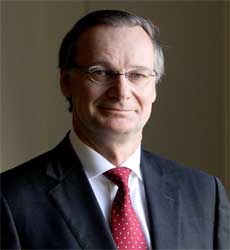WEF's 'Crowdsourcing' push to find ways to control internet

WEF, which each year gathers the global elite in the plush Swiss ski resort of Davos, launched its NETmundial Initiative in a bid to build on the outcome of a large conference in Brazil in April that called for a transparent, multi-stakeholder approach to running the Web.
The participants at that conference balked at a push by some countries, including China and Russia, for governments to move into a leading role in overseeing the internet, amid fears of the impact this could have on the unity of the Web and on online dissent and freedom of expression.
The WEF project aims to put the goals decided in Brazil into action by bringing as many voices as possible into the growing global debate over how to govern the internet without jeopardising its diversity.
"The platform will basically enable "crowdsourcing with the best experts in the world" to help determine the path forward on a wide range of issues," said Pierre Nanterme, a member of the WEF steering board and Chief Executive of management consultancy Accenture.
Using best expertise available
"We have to find global solutions, global standards for the internet, because the beast is global," he told AFP.
Through a series of "open and transparent" dialogues with political decision makers, technical experts, business leaders and online privacy and rights advocates and others, WEF aims in coming months to help pinpoint the main issues and problems surrounding internet governance globally and to begin creating a bank of expertise that policy makers can draw from.
"The process will culminate in a summit on the issue during the organisation's annual Davos meeting next January," WEF Chairman Klas Schwab told reporters.
"The goal is not to create an organisation to oversee the Web, but to make sure that the internet does not become fragmented," he said.
The discussions kicked off with a meeting at WEF's global headquarters in Geneva of more than 70 top leaders from different sectors.
President of Estonia Toomas Hendrik Ilves, the creator of the World Wide Web Tim Berners-Lee, the head of US-linked global internet regulator ICANN, and a wide range of diplomats figured among the participants.
More than 20,000 others followed their discussions online with many weighing in on the debate via Twitter.
Source: AFP via I-Net Bridge
Source: I-Net Bridge

For more than two decades, I-Net Bridge has been one of South Africa’s preferred electronic providers of innovative solutions, data of the highest calibre, reliable platforms and excellent supporting systems. Our products include workstations, web applications and data feeds packaged with in-depth news and powerful analytical tools empowering clients to make meaningful decisions.
We pride ourselves on our wide variety of in-house skills, encompassing multiple platforms and applications. These skills enable us to not only function as a first class facility, but also design, implement and support all our client needs at a level that confirms I-Net Bridge a leader in its field.
Go to: http://www.inet.co.zaRelated
Forvis Mazars disputes PetroSA deal allegations 10 Feb 2025 How to build a strong multi-domain name strategy 3 Feb 2025 Re.Bag.Re.Use: Africa's only winner at the Global Alliance World PR and Communication Awards 2024 28 Nov 2024 #WomensMonth: Michele Serfontein, Ocean Basket franchisee says "women need to be at the table to have a voice" 29 Aug 2024 WEF founder Klaus Schwab to resign 27 May 2024 How to make the most of a .click domain name 7 May 2024


